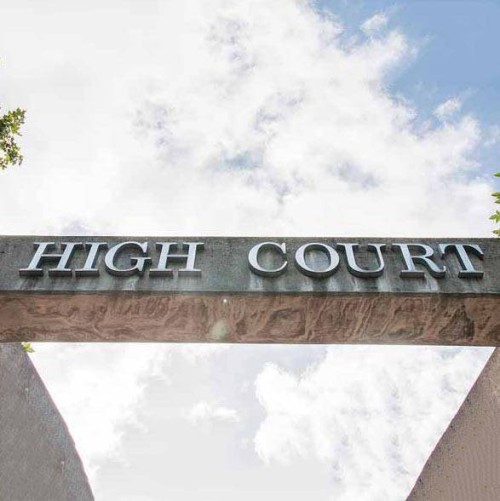Judge rules Du Val can bring defamation claim against NBR
NBR’s publisher had argued in July against the claim going to trial.
Du Val’s Lakewood Plaza development in Manukau.
NBR’s publisher had argued in July against the claim going to trial.
Du Val’s Lakewood Plaza development in Manukau.
A High Court judge has found a defamation case brought by Du Val group co-founders John Kenyon Clarke and Charlotte Clarke against NBR publisher Fourth Estate Holdings can proceed to trial.
The case relates to an NBR Shoeshine column on unregulated property investment products published in April 2021, which contained the sentence: “Then there is the Du Val Foundation, a charitable entity which raised $26,000 in 2019 (the last year for which accounts are available), incurred $18,000 in expenses, and gave away just $2,300.”
The plaintiffs contend the statement could have four defamatory meanings, including that the Clarkes’ operation of the foundation might be in some way unlawful, unethical, or improper.
Both the husband and wife are trustees of the Du Val Foundation.
In July, a hearing was held before Justice Michael Robinson to determine whether the words are capable of bearing the alleged meanings, not whether they do bear the meanings, which would be a substantive matter for trial if it gets that far.
On Friday, the judge found that the sentence in the article was capable of the defamatory meanings alleged.
“Namely that there are reasons to suspect or investigate whether the plaintiffs operated the Du Val Foundation unlawfully, or improperly or unethically, by spending the vast majority of funds collected on unspecified expenses unconnected to its charitable purposes,” the judgment said.
“Whether or not the sentence actually means what the plaintiffs allege it to mean is a matter for another day.”
The judge awarded costs in favour of the plaintiffs.
Fourth Estate Holdings will continue to defend the proceedings.

In July, Fourth Estate Holdings’ lawyer Laura O’Gorman KC argued that there could be no inference from the quoted sentence that the Clarkes had improperly used the foundation’s money to fund their lifestyle.
“There is certainly an available meaning that there is a criticism for the low amount that is given away in comparison with the level of wealth that [Kenyon Clarke] is proud of achieving, but there’s certainly no allegation that that level of funds raised, let alone expenses, could be anything to do with how the Clarkes have funded their lifestyle …
“There is no way that anyone would think that this is saying that he has funded expensive cars and his $750 million empire by using $18,000 of expenses in this particular 2019 year, or in any other sense.”
Stating facts about the funds the charity raised, the expenses it incurred, and how much it gave away did not give rise to a meaning that those things were unconnected with the foundation’s charitable purpose, she said.
Justice Robinson asked O’Gorman during the hearing whether the sentence “invites suspicion” by suggesting that there are questions that need to be answered about the foundation. She replied that there was nothing to suggest that there are questions about whether the expenses are properly incurred, or any allegation or imputation that they’re outside the statutory purpose of the charity.
In his judgment, Robinson found the sentence was capable of leaving an ordinary reader with the impression that more should have been given away, “but because of something suspicious about the deduction of expenses it was not.
“In the context of the article as a whole with its highly suspicious tone I am satisfied that the sentence is capable of leaving the ordinary and reasonable reader with the impression that the author has the same intrigue, curiosity and unanswered questions about the Du Val Foundation that she has about the Du Val Group.
“In particular, intrigue, curiosity and unanswered questions about how they each deal with money.”

John Kenyon Clarke and Charlotte Clarke.
The Clarkes’ lawyer Davey Salmon QC had argued in July the most likely reading was that readers would see the intended meaning as: “For some reason that warrants suspicion or investigation, not enough is getting to the end charitable purposes from money that reaches the charity.”
He noted such issues were a common problem with charities all around the world, so it would be a relatively easy inference for an ordinary reader to make.
Salmon cited the comparison within the article between Du Val and another property developer Williams – which the article notes did respond to the NBR’s questions – as implying that Du Val is not as upfront and transparent, and that could be a reason for caution or suspicion.
Justice Robinson asked Salmon during the hearing whether that reflected the fact that Du Val did not return the NBR’s calls when Williams did?
“Yes, that is a fact, but the question is how that fact, and then the other points made – the negative comments about some of Du Val's investment products, and the positive comments about Williams’ ones – read to the ordinary reader in context where they then go on to read the sentence about the trusts.”
The negative comparison also heightens the notion that the article is not just about the industry and unregulated investment offers, but “something specific about Du Val”, which is extended to the Clarkes and their charity, Salmon said.
“In that context, there’s a sentence about the fraction – the ‘just $2300’ – going to the charitable end purposes in an article where that makes no sense to the reader except as part of a picture of sketchiness, suspicion, untrustworthiness, fishiness – whatever word we choose to use – surrounding Du Val and the Clarkes.”
A fully copy of the judgment can be found here.